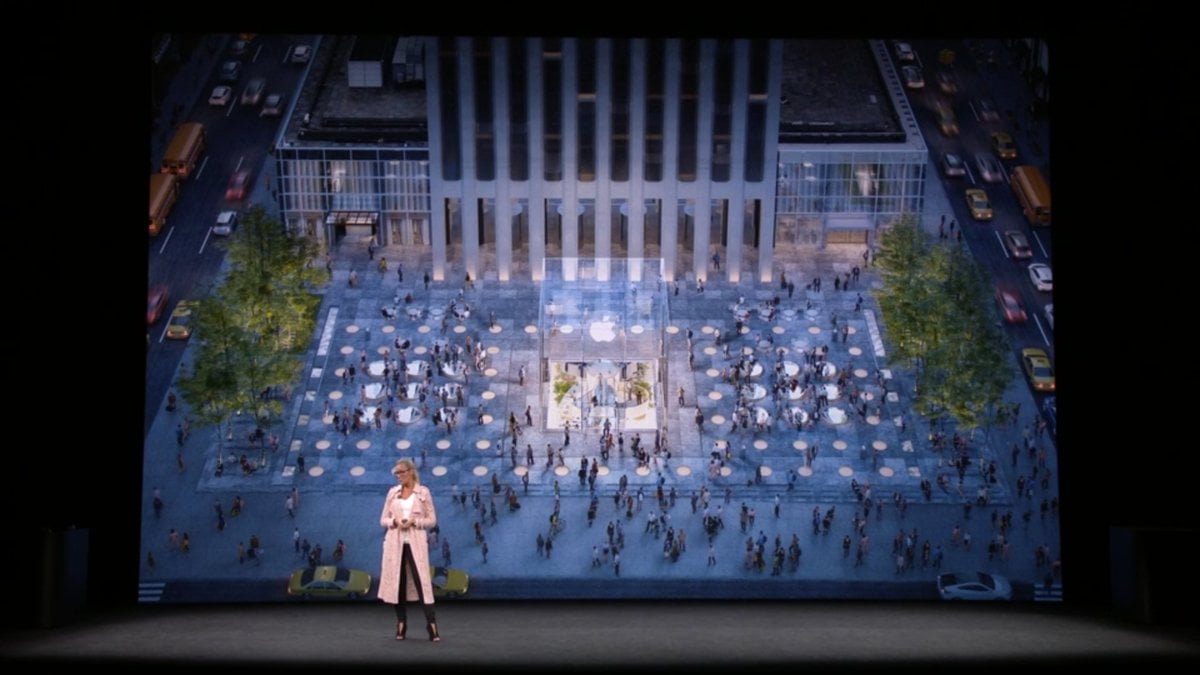

Angela Ahrendts speaks in Apple’s Steve Jobs theatre in Cupertino last week. The retail chief’s takeover of the ‘town square’ model betrays the company’s sometimes patronising attitude to the world outside its bubble © Getty
Outside the bubble of self-praise where Apple product launches take place, much of what its executives say sounds absurd. Angela Ahrendts’ declaration last week that its stores are now called “town squares” barely stood out.
It wasn’t even completely new. Ms Ahrendts, the former Burberry boss who is the technology company’s retail chief, unveiled the stores’ redesign last year. She laid claim then to the language of city planning.
The new shops have “avenues” (of Apple products, naturally) and “forums”, for talks about photography or coding (on Apple products). The largest link to “plazas”, where concerts and events can take place, and feature tree-planted “genius groves”, where service technicians roam free.
But Ms Ahrendts’ latest lexical takeover is more than just branding nonsense. It betrays Apple’s — and indeed Silicon Valley’s — sometimes patronising attitude to the world outside its bubble, and it is as arrogant as it is presumptuous.
I am not calling for a sterile separation of civic and commercial spaces. That would be almost as ahistorical as Apple’s “town squares”.
There are reasons why “marketing” contains the word “market”. Writing about agoras — the ancient Greek gathering places that evolved into town squares — critic Michael Kimmelman writes: “People who didn’t like cities, and disliked democracy in its messiness, complained that agoras mixed religious and sacrilegious life, commerce, politics, and theatre. But of course that was also their attraction and significance. The agora symbolised civil justice; it was organic, changeable, urbane.”
Think of Salamanca’s Plaza Mayor or Siena’s Piazza del Campo, surrounded by religious and secular buildings, homes, cafés and restaurants, and, of course, places to buy and sell. In such spaces, hawkers, buskers, hucksters, food vendors, itinerant snake-oil salesmen and established merchants mingle with locals and visitors out for a stroll. Always have and always will. At least, that is what I thought until Apple came along and laid claim to the town square for its own purposes.
Take the technology company’s plans for the Carnegie Library in Washington DC. The Beaux Arts-style building was opened in 1903 on the back of Andrew Carnegie’s philanthropy, “dedicated to the diffusion of knowledge”. It was, for a time, the only public place in the US capital’s downtown area where African-Americans could use the bathrooms.
These are values Apple supports. But under its lease, it will turn most of what was a neutral public space into a monument to what it produces. The building will still be open to the public for exhibitions, concerts and other events. The ultimate aim, though, is to sell more Apple stuff.
I am a great supporter of the idea that businesses should root themselves in the places where they operate. Even some banks, chastened by the financial crisis, are starting to think of branches as community hubs rather than costly overheads. “What happens when you are the last bank in the village?” pondered one UK bank chairman in a recent discussion about how to use its presence to encourage social inclusion.
I can also understand why city planners succumb to the temptation of Apple. Better a tasteful, architect-led restoration than continued neglect and ultimate dereliction. The New York Landmarks Conservancy last year gave Apple its chairman’s award for “marrying high tech and distinguished architecture” with stores at places such as the city’s Grand Central Terminal.
As in many marriages, money does make a difference. When retail chains fail they leave gaping holes in town centres and shopping malls that are worse than the thriving tech company’s wood-and-glass shops.
But the square has a sacredness and permanence out of sync with business cycles. Barely a decade ago, cities would have leased their public spaces to stores run by the then champion of mobile devices, Nokia. What happens when Apple rots, as it one day will?
The very nature of how people use most Apple products — head down, AirPods in — is at odds with the look-up, look-around, listen-out ethos of the town square. More important, no private company should be able to arrogate to itself the unruly traditions of shared urban spaces: chattiness, flirtation, impromptu performance, and protest. The last is virtually unimaginable in the ordered cool of an Apple “town square”.
Great cities offer the “widest facilities for significant conversation”, according to Lewis Mumford, the 20th-century urban theorist. Dialogue, he wrote, is “one of the ultimate expressions of life in the city”.
Apple has a right to rebrand its stores and to be part of that conversation. But when towns’ central venues for expression come badged with an Apple logo, something vital has been lost.
[“Source-ft”]

